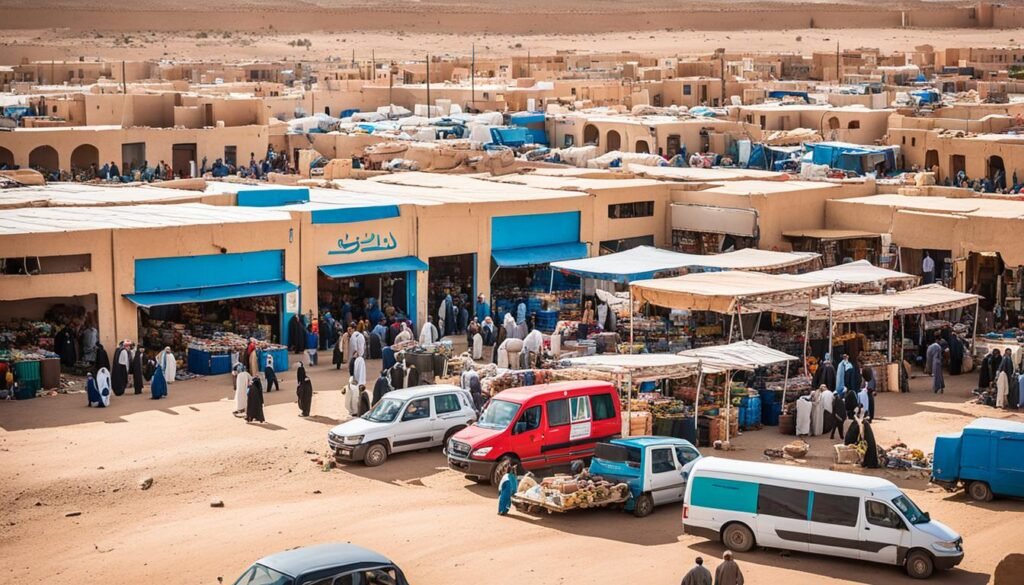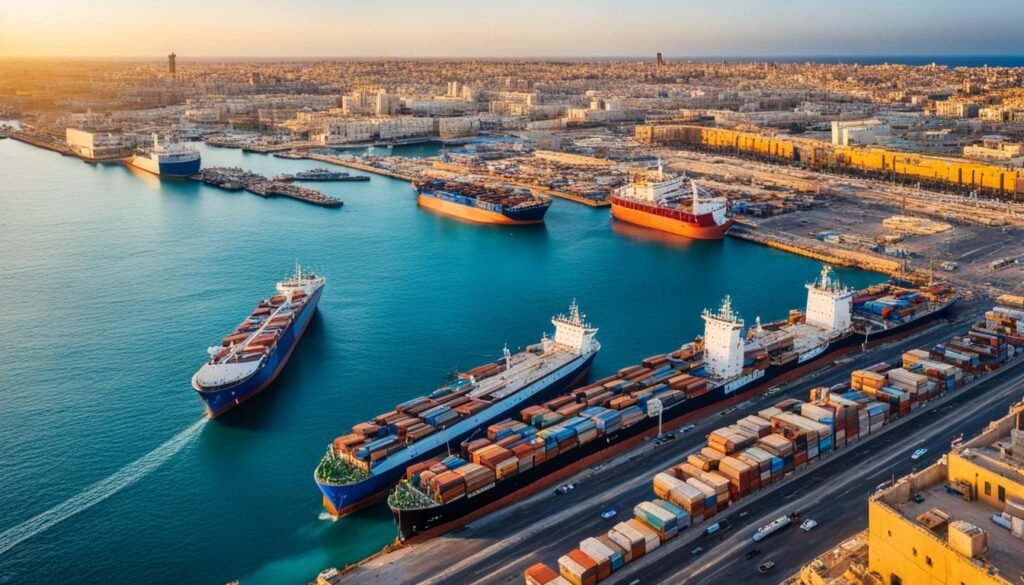Libya’s oil and gas industry is a powerhouse in the global energy landscape, boasting an estimated 48 billion barrels of proven crude oil reserves – the largest in Africa. As a member of OPEC, the country’s Mediterranean oil resources have made it a strategic hub for energy management, with Tripoli serving as the nerve center for the nation’s vast petroleum sector, which is dominated by the state-owned National Oil Corporation (NOC).
This article will delve into the intricacies of Libya’s oil and gas industry, exploring the regulatory changes that have transformed the landscape, the challenges and opportunities facing international oil companies operating in the country, and the impact of political instability and power struggles on the industry’s future.
Key Takeaways
- Libya is a major player in the global oil and gas industry, with vast proven crude oil reserves in the Mediterranean region.
- Tripoli, the capital and commercial center, serves as the nerve center for Libya’s petroleum sector, which is dominated by the state-owned National Oil Corporation (NOC).
- The article will explore the regulatory changes, challenges, and opportunities facing international oil companies operating in Libya’s energy sector.
- Political instability and power struggles in the country have had a significant impact on the oil industry’s development and investment.
- Libya’s production goals and investment needs are crucial factors in determining the future of its oil and gas industry.
Libya’s Oil Sector: A Lucrative Opportunity
Libya’s oil sector represents a remarkable opportunity for both domestic and international players. The country boasts some of the largest oil reserves in Africa, making it a prime destination for foreign investment. In 2007, Libya earned a staggering $40 billion in hydrocarbon revenues, underscoring the immense potential of the sector.
Massive Oil Reserves and Revenues
Libya’s Libya’s oil reserves are estimated to be the largest in Africa, giving the country a distinct advantage in the global energy landscape. This abundant resource has generated substantial Libyan oil revenues over the years, with the sector accounting for a significant portion of the country’s GDP. The lifting of UN and US sanctions in the early 2000s has further paved the way for increased foreign investment and a renewed focus on developing Libya’s vast energy resources.
Foreign Investment and International Interest
Since the sanctions were lifted, the Libyan oil and gas industry has witnessed a surge in international interest, with over 40 companies securing upstream concessions in the country. This influx of foreign investment has been a driving force behind the sector’s growth, as international oil companies seek to capitalize on Libya’s Libya’s oil reserves and tap into the country’s lucrative oil revenues.
Regulatory Changes: Promoting Local Participation
The Libyan government has recently introduced significant reforms that fundamentally impact how foreign firms conduct business with the country’s state-dominated oil and gas sector. A key change was the closure of two overseas agencies – Mediterranean Oil Services Company (Medoil) and Umm al-Jawaby Oil Service Company – which had previously been responsible for procuring goods and services on behalf of the hydrocarbons industry.
This move has required international companies to engage directly with the National Oil Corporation (NOC) and other state-owned oil companies, rather than relying on these intermediary agencies. The goal is to promote greater local participation in the Libyan oil industry, reducing the reliance on overseas procurement agencies and encouraging foreign firms to work more closely with Libyan partners and suppliers.
Closure of Overseas Procurement Agencies
The closure of Medoil and Umm al-Jawaby Oil Service Company has disrupted the traditional ways that foreign companies have operated in Libya’s oil and gas sector. International firms must now navigate a more direct relationship with the NOC and other state entities, presenting both challenges and opportunities for increased local involvement and collaboration.

These regulatory changes aim to bolster the role of Libyan companies and individuals in the country’s lucrative hydrocarbons industry, aligning with the government’s broader efforts to promote national participation and reduce the reliance on foreign intermediaries. As foreign firms adapt to this new landscape, they must find innovative ways to work with local partners and suppliers to maintain their presence and competitiveness in the Libyan market.
Joint Venture Requirement for Foreign Companies
Libya’s oil and gas sector has undergone significant regulatory changes in recent years, with a focus on promoting greater local participation. One of the most notable changes was the introduction of Libyan Law 443 in 2006, which mandates that international companies seeking to operate in the country must form a joint venture with a local partner.
Under this legislation, foreign companies are limited to a maximum 65% stake in any Libya-based branch, with the remaining 35% or more required to be held by a Libyan partner. This joint venture requirement applies across various sectors, including the lucrative oil and gas industry, as the Libyan government aims to foster greater economic growth and integration of the local private sector.
The local partner requirement for foreign oil companies in Libya has been a key part of the country’s efforts to reshape its relationship with international firms. By ensuring that Libyan entities have a significant stake in these ventures, the government hopes to capture more of the economic benefits and technological know-how that foreign investment brings to the table.
The implementation of Libyan Law 443 and the joint venture requirements have had a significant impact on the operating landscape for international oil companies in the country. Navigating these regulatory changes and finding reliable local partners have become critical factors for foreign firms seeking to maintain a presence and pursue new opportunities in Libya’s lucrative energy sector.
Libya’s Private Sector: Emerging From the Shadows
As Libya’s oil and gas industry undergoes significant regulatory changes, the Libyan government is making concerted efforts to promote the growth of the private sector. Historically, the Libyan private sector has operated largely in the black or grey markets, with state-owned enterprises dominating the economic landscape. However, the government’s push to “bring the private sector out of the shadows” is seen as a strategic move to create more visible employment opportunities and generate greater tax revenues for the state.
The regulatory changes in the oil and gas sector are part of a broader initiative to encourage local Libyan companies to play a greater role in the country’s economy. This shift aligns with the Libyan government’s efforts to reduce its reliance on foreign investment and empower domestic enterprises, especially in the lucrative oil industry. As a result, the growth of local companies in the Libyan oil industry has become an increasingly prominent trend.

The government’s promotion of the Libyan private sector is expected to have far-reaching implications. By fostering the development of local companies, the Libyan government aims to create more visible employment opportunities and generate greater tax revenues for the state. This strategy is seen as a way to diversify the economy and reduce the country’s dependence on oil exports, which have traditionally dominated the Libyan economy.
Challenges and Complexities of the New Regulations
As Libya’s oil sector undergoes significant regulatory changes to promote local participation, international companies operating in the country face a series of challenges and complexities. Finding suitable local partners and establishing trust is a critical hurdle for foreign firms seeking to navigate the new joint venture requirements.
Finding Local Partners and Establishing Trust
Businesses have reported difficulties in identifying and collaborating with local Libyan partners that meet the necessary criteria and possess the required expertise and resources. Building trust and aligning interests between international and domestic players has proven to be a complex and time-consuming process, as foreign companies strive to adapt to the changing rules of the game.
Legal and Administrative Hurdles
The legal and administrative complexities of Libya’s new regulatory framework, coupled with a reputation for bureaucratic inefficiency in Tripoli, present significant obstacles for international oil and gas companies. Foreign firms must work diligently to understand and comply with the evolving rules and regulations, often navigating a labyrinth of paperwork and bureaucratic procedures.
The transition from the previous system, which relied on the intermediary agencies of Medoil and Umm al-Jawaby, has also been a source of concern for some businesses, as they adapt to the new requirements for local participation and partnership.
Libya: Mediterranean Oil Management Tripoli Libya
Libya, strategically situated along the Mediterranean coastline, has emerged as a significant player in the global oil and gas industry. Tripoli, the nation’s capital, serves as the epicenter of Libya’s oil management and administration. This vibrant city has become a hub for international oil companies seeking to capitalize on the country’s vast hydrocarbon resources.

Libya’s oil sector has long been a lucrative opportunity for foreign investors, with its massive oil reserves and substantial revenue potential. The nation’s regulatory landscape, however, has undergone significant changes in recent years, promoting greater local participation and reshaping the way international companies operate within the country.
The implementation of new regulations, such as the closure of overseas procurement agencies, has created both challenges and opportunities for oil companies navigating the Libyan market. Adapting to these evolving policies and forging successful partnerships with local entities have become essential for international players seeking to maintain a competitive edge.
Tripoli, as the epicenter of Libya’s oil management, serves as a crucial nexus for the industry’s activities. From government oversight to business operations, this vibrant city plays a pivotal role in shaping the future of Libya’s energy landscape and its continued integration into the global market.
The Impact on International Oil Companies
The regulatory changes in Libya’s oil and gas sector have presented significant challenges for international oil companies operating in the country. These companies must now adapt to a new landscape that requires them to form joint ventures with local partners and engage directly with the National Oil Corporation and other state-owned entities.
The impact of Libyan regulations on international oil companies has been substantial. Foreign firms must invest time and resources in finding suitable local partners, understanding the legal and administrative requirements, and establishing trust and effective working relationships. This process can be time-consuming and complex, as international oil companies must navigate a changing political and regulatory environment.
Adapting to the Changing Landscape
To succeed in this new landscape, international oil companies must be agile and adaptable. They need to develop strategies to effectively collaborate with local partners, comply with the new regulations, and maintain their competitiveness in the market. This may involve exploring new business models, investing in local capacity building, and fostering stronger relationships with Libyan stakeholders.
As international oil companies adapt to the changes in Libya, they must also be mindful of the impact of these regulations on their operations and profitability. The requirement to form joint ventures and work closely with state-owned entities can introduce new challenges, such as navigating complex legal frameworks, managing diverse stakeholder interests, and ensuring the alignment of strategic priorities.
Despite the challenges, many international oil companies remain committed to the Libyan market, recognizing the significant oil and gas reserves and the potential for long-term growth. By adapting their strategies and leveraging their expertise, these companies can navigate the changing landscape and continue to play a vital role in the development of Libya’s energy sector.
Political Instability and Power Struggles
Libya’s oil and gas industry has been plagued by ongoing political instability and power struggles since the fall of Muammar Gaddafi in 2011. The country is currently divided between rival governments, with the internationally recognized Government of National Unity based in Tripoli and the rival administration in the east. This fragmented political landscape has led to competing interests and power dynamics within the oil sector, with influential actors such as the NOC chairman, the oil minister, and the eastern warlord Khalifa Haftar all vying for control.
Rival Governments and Competing Interests
The political instability and lack of unity in Libya pose significant challenges for international oil companies seeking to operate in the country. The rival governments and competing interests within the Libyan oil industry have created a complex and unpredictable environment, making it difficult for foreign players to navigate the regulatory landscape and secure their investments. As the power struggles continue, the future of Libya’s oil and gas sector remains uncertain, with the potential for further disruptions and instability.
Production Goals and Investment Needs
Libya’s oil industry is poised for a resurgence, with the country aiming to boost its Libyan oil production goals to 2 million barrels per day in the next five years. This ambitious target would surpass the nation’s pre-2011 production levels, signaling a promising future for the Mediterranean nation’s energy sector. However, achieving these Libyan oil production goals will require substantial investment and a stable political climate – both of which have been elusive in recent years.
Libya’s oil and gas infrastructure has suffered significant damage due to years of conflict, and substantial investment will be needed to rehabilitate and expand the country’s production capacity. Attracting the necessary investment in the Libyan oil industry will depend on the government’s ability to provide a stable and predictable operating environment for international oil companies.
The path to Libya’s energy resurgence is not without its challenges. Political instability and power struggles have plagued the country, creating uncertainty for foreign investors. Nonetheless, the potential rewards of tapping into Libya’s vast oil reserves are significant, and the government is working to create a more favorable investment climate to drive the necessary investment needed in Libyan oil industry.
Uncertainty and Risk Factors for Foreign Players
Libya’s oil and gas sector presents lucrative opportunities for international companies, but operating in the country also comes with significant uncertainty and risk factors. Security challenges, including ongoing conflict, attacks on critical infrastructure, and political instability, pose constant threats to oil production and the safety of personnel. Foreign firms must also navigate a complex web of stakeholders, including rival governments, local militias, and power brokers, adding an additional layer of complexity to their operations.
Security Challenges and Stakeholder Management
The security landscape in Libya remains volatile, with periodic outbreaks of violence and attacks targeting oil facilities and personnel. Navigating this environment requires robust security measures and close coordination with local authorities and stakeholders. Effective stakeholder management, including building trust and maintaining positive relationships with a diverse set of players, is crucial for foreign companies to succeed in the Libyan market.
Adapting to the rapidly changing political and security landscape is also a key challenge. Foreign firms must be agile and responsive, constantly monitoring the situation and adjusting their strategies accordingly. Failure to do so can result in significant operational disruptions and financial losses.

Despite the risks, the potential rewards of investing in Libya’s oil and gas sector remain alluring. Companies that are able to effectively manage security challenges and stakeholder relationships will be better positioned to capitalize on the country’s vast energy resources and drive growth in the years to come.
The Road Ahead for Libya’s Oil Industry
The future of Libya’s oil and gas sector remains uncertain, as the country grapples with ongoing political divisions, security challenges, and the need for substantial investment to rehabilitate and expand production capacity. While recent regulatory changes have aimed to promote local participation and economic growth, the fragmented political landscape and competing interests within the industry continue to pose significant hurdles.
Achieving the government’s ambitious production goals will require a sustained period of stability and the ability of the Libyan authorities to provide a predictable and secure operating environment for foreign players. The outlook for the future of the Libyan oil industry is complex and fraught with risk, but the country’s vast energy resources continue to make it a coveted prize for global energy companies.
Despite the challenges, the potential for the Libyan oil and gas sector remains substantial. The industry’s recovery and growth will depend on the government’s ability to resolve political conflicts, improve security, and attract the necessary investment to modernize and expand production capabilities. As the country navigates this uncertain path, the future of Libya’s oil industry will have a significant impact on the global energy landscape.
Conclusion
Libya’s oil and gas sector represents a lucrative opportunity for both domestic and international players, but navigating the complexities of the industry in the country is no easy feat. The regulatory changes introduced by the Libyan government, aimed at promoting local participation and economic growth, have introduced new challenges for foreign companies operating in the country. From finding suitable local partners to overcoming legal and administrative hurdles, international oil firms must adapt to the shifting landscape.
Amid ongoing political instability, power struggles, and security concerns, the future of Libya’s oil industry remains uncertain. Achieving the country’s ambitious production goals will require sustained investment, political unity, and the ability to provide a stable and secure operating environment for global energy companies. As Libya continues to play a crucial role in the global energy market, the road ahead for its oil and gas sector will be closely watched by industry players and policymakers alike.
Despite the challenges, the potential rewards for those willing to navigate the complexities of Libya’s oil and gas industry are significant. With its vast reserves and strategic location, Libya remains a key player in the global energy landscape. As the country works to rebuild and stabilize its economy, the oil and gas sector will undoubtedly play a central role in its long-term development and prosperity.
Source Links
- Tripoli changes the rules | MEED – https://www.meed.com/tripoli-changes-the-rules
- Libyan oil minister charged with corruption – https://www.spglobal.com/commodityinsights/en/market-insights/latest-news/oil/080924-libyan-oil-minister-charged-with-corruption
- Libya’s “dramatic” oil minister replacement may revive production following years of volatility – https://worldoil.com/news/2024/3/28/libya-s-dramatic-oil-minister-replacement-may-revive-production-following-years-of-volatility/


